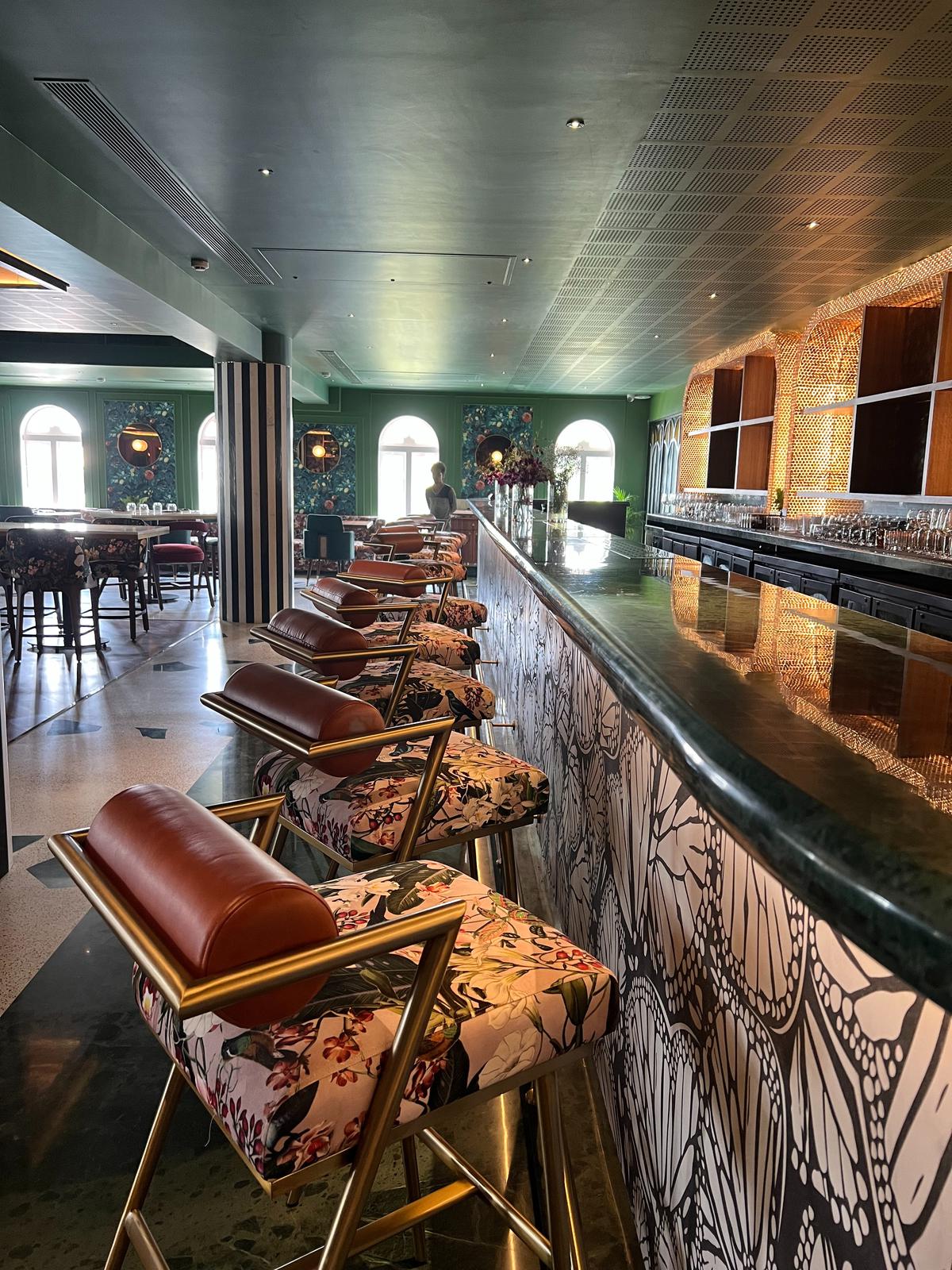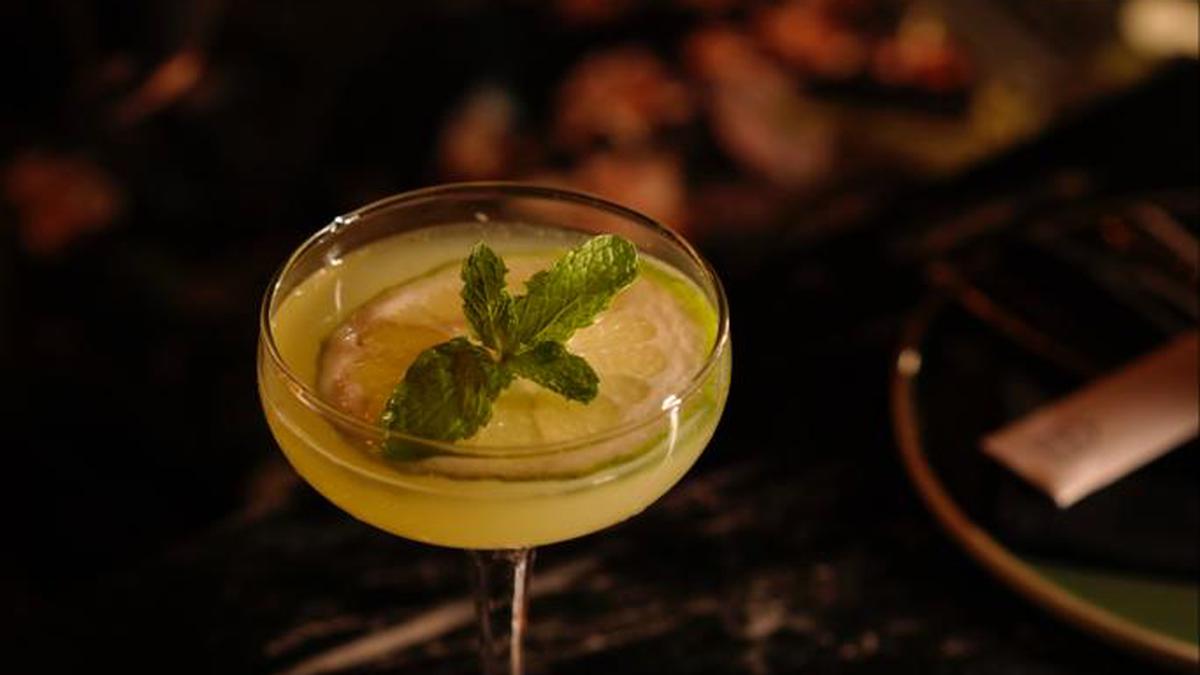At Hortus, the Garden of Malabar, the spirits of Hendrik van Rheede, Itty Achuthan, Appu, Ranga and Vinayak Bhatt rise as one quaffs the Dutch Punch. The above mentioned names are that of the Dutch Governor, the Malayali herbalist and the Konkani Ayurveda physicians who were behind the 17th century treatise, Hortus Malabaricus (a 17th-century botanical treatise on the medicinal properties of flora of the Malabar coast) . The drinks at this newly-opened cocktail bar in Kochi are based on ingredients mentioned in the 12 volumes of the tome first published in 1678.
Developed and created by Goa-based bar constultants Karl Fernandes, Akshit Sharma and their team from Countertop, Goa, the cocktails here are conversation starters. Distinct notes of mango, spices, coconut and jaggery rise delicately in this charming blend.
Located on the third floor of Hotel Avenue Center in Panampilly Nagar, the bar is themed around the Hortus Malabaricus too, with a 40-foot long bar counter, possibly the longest in Kerala. The tropical jungles flow on to the furnishing and furniture as printed, painted, sculpted leaves, flowers, vines and creepers. The garden flows on to mosaic table tops and hand-painted Malabar tree nymphs fill the bar counter.
A private party space and a smoker’s zone are designated corners in the spacious 4,500 square feet space.
“Hortus will serve all kinds of foods but is looking at “small plates to share” and not an extensive menu. As Japanese cuisine is getting popular, the accent here will be on Pan Asian with more of Japanese dishes,” says Isaac Alexander, proprietor and the man behind the concept bar.

The 40 feet long bar counter top at Kochi’s cocktail bar, Hortus- The garden of Malabar
Pack a punch
“It’s interesting history that the Punch, which comes from the Hindi word paanch, meaning five, originated in India in the 1700s; it was consumed by people who travelled the spice route,” says Karl, who is the Head Bar Consultant of Countertop, Goa, and headed a bar in South Goa that was rated No. 4 among the best 50 bars in Asia. He adds that the five ingredients—sugar, local alcohol, spices, juice and water— are used in a punch.
The team studied the history of the Malabar coast, read up books and zeroed in on the prominent ingredients of the region, like, green pepper, lemons, peanuts and tamarind to prepare a bespoke drinks menu. It took them several months to develop the drinks in a process that involved clarification techniques like fat and milk washes, preparing oleo citrate(citrus oil) and oleo saccharum (sugared oil).
In a nod to contemporary mixology, the bartenders created ‘Malabar stock’ a brew of boiled spices and carrots, which forms the base in some of the drinks. Clean, powerful flavours were produced by muddling citrus fruit peels, using a coconut milk wash, and sieving drinks through a coffee filter. They also added an extensive ice programme.
The Merchant of Muziris – a signature cocktail at Hortus
“Developing and preparing cocktails is a science. The ice programme is about cutting clear blocks of ice over a certain period using certain techniques. “Cloudy ice looks poor for a clear drink, besides some drinks like the good old fashioned cocktail, need a slower dilution as you sip on it,” explains Karl.
Bespoke cocktails
A signature cocktail here is ‘The Merchant of Muziris’ (an old trading port), based on the classic Old Fashioned. It uses St Remy brandy, roasted peanuts and is finished with a dash of Rojak, a vegetarian version of an Asian Salad dressing. “We created a spirit forward cocktail, an on-the-rock kind of a drink,” says Karl adding that “The Malabar version does not use fish sauce, instead it has tamarind, sesame and green pepper.” According to him green pepper is niche and easily available only in Kerala. “It has a certain spice and note, which is fruity.” The cocktail is served with a burnt orange wedge.
The Malabar Kahwah,“an espresso martini” is a take on Kerala’s chukku k aapi or spiced ginger coffee. It uses vodka, chukku coffee concoction, “vermouth for body and green cardamom tincture”, which lends it a distinct nose. Malabar berries come alive in Nelcynda (a port of ancient Kerala) Sour, a spiced daiquiri with Velvet Falernum (a liqueur sweetened with sugarcane); the Curry Lemon Spritzer uses big citrus fruits with Cointreau. “It highlights the unique lemons used in Malabari cuisine,” says Karl.
“The city is ready for a modern cocktail bar and Hortus will set the trend,” adds Karl, on Kochi’s changing bar culture.
The 200-seater cocktail bar and lounge
The coupe is back
According to Karl, glasses play a stylish role in the entire experience and that the old style coupe glasses are back, replacing Martini glasses. The Nick and Nora glasses (named after fictional detectives bartender Dale DeGroff for Nick and Nora Charles) used for Manhattan and dry Martinis too are back and trending.
Stay connected with us on social media platform for instant update click here to join our Twitter, & Facebook
We are now on Telegram. Click here to join our channel (@TechiUpdate) and stay updated with the latest Technology headlines.
For all the latest Food and Drinks News Click Here

